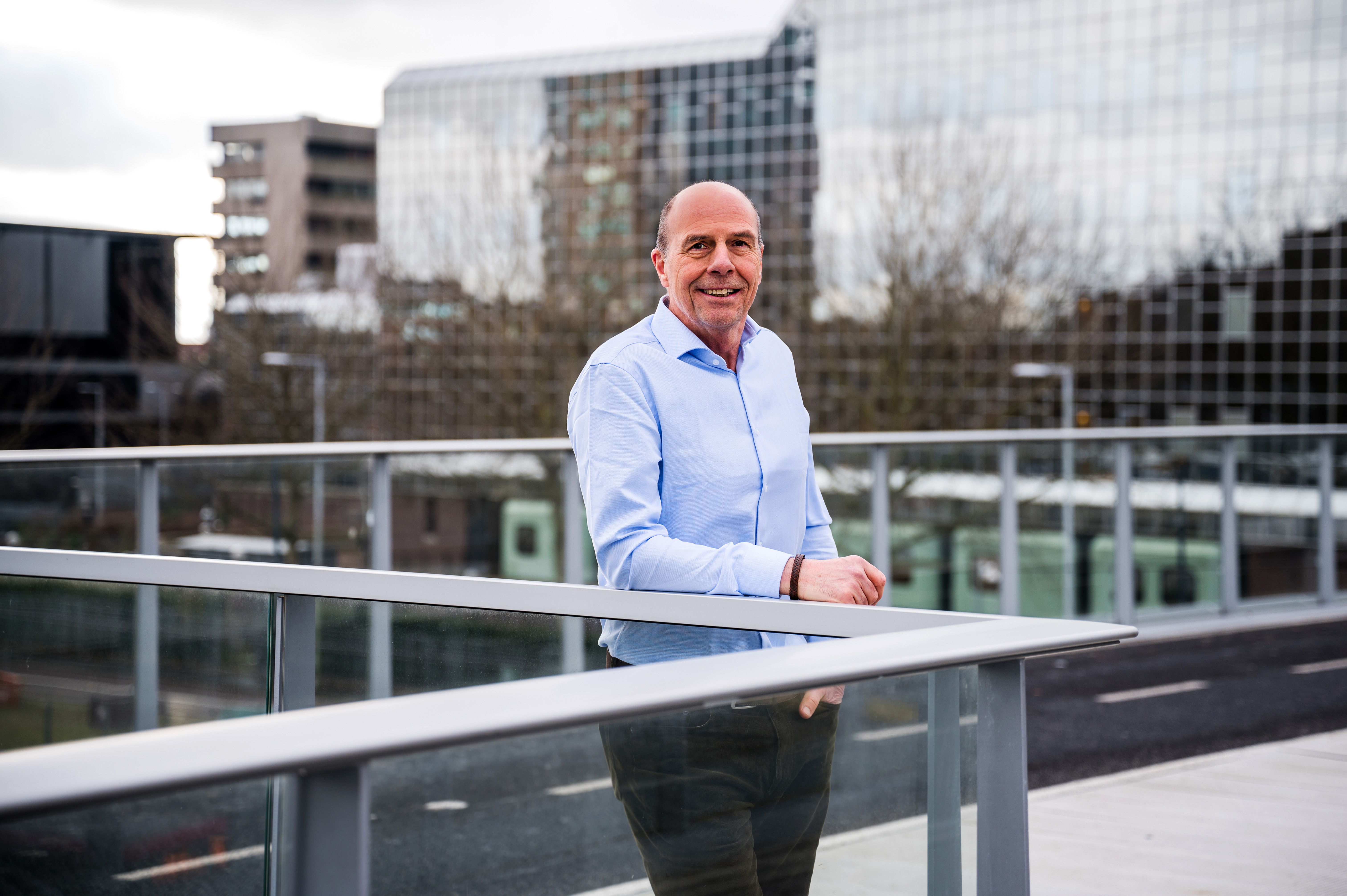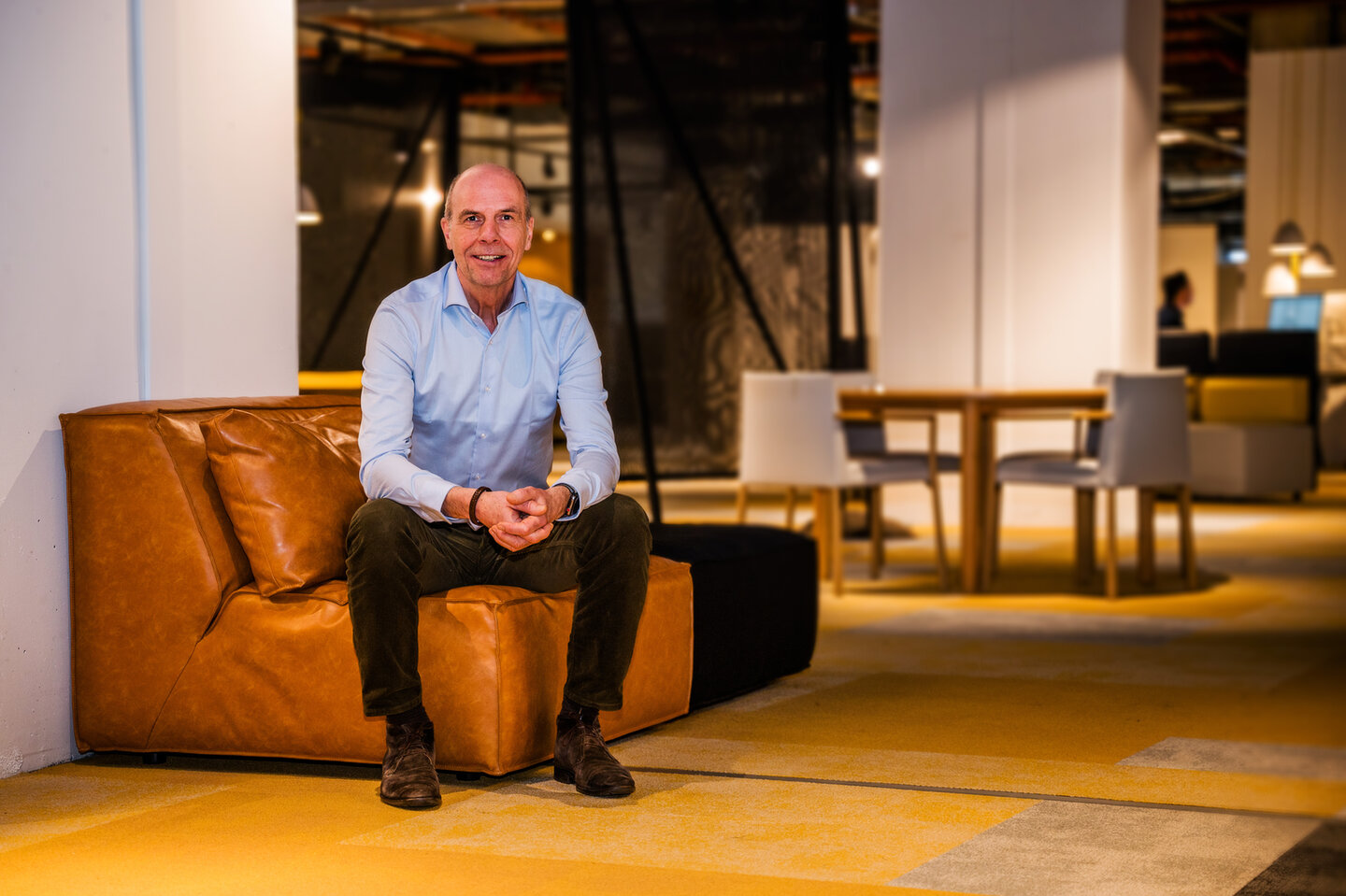Demonstrator Projects
06
Ideas Spread like Ink Spots: Mark Krul on Innovating Cancer Drug Development
“I’ve been involved in oncology for almost my entire adult life,” says Mark Krul, Chief Scientific Officer of Oncode Accelerator Foundation. “And I’ve seen so much promising oncology research – but too often it is not translated to patients. I find that unethical.”

This strongly held conviction has guided Mark’s career. He has seen many different sides to cancer drug development over a career that has spanned leadership positions at the NDDO Research Foundation, the European Cancer Center, and the Dutch National Institute of Public Health and Environmental Protection. Time and again, he saw promising research published in top journals – but then the experimental drugs got stuck in the filing cabinet rather than translated into new cancer therapies.
This frustration transformed into the motivation behind a defining step in Mark’s career: founding Aglaia Oncology Funds, an investment fund devoted exclusively to oncology drug development companies.
“I wanted to use my experience to support biotech companies, valorize academic research, and bring new cancer drugs to market. Aglaia has successfully incubated and sold several companies and supported the development of new products. But it still takes 15 to 20 years to bring an oncology drug from discovery to patients. That’s far too long; the process needs to become more efficient.”
We are here to collaboratively work on accelerating oncology drug development. To outsmart cancer and impact lives. We share the same goal and are all part of the same ecosystem.
By Katell Maguet, Patient Advocate
Arnoud Huisman, CEO and member of the board of the Oncode Accelerator Foundation
Oncode Accelerator aims to truly innovate the drug development system for oncology.
By Katell Maguet, Patient Advocate
Mark Krul, Chief Scientific Officer of Oncode Accelerator Foundation
A New Mission to Optimize and Accelerate Cancer Drug Development
When the opportunity to join Oncode Accelerator appeared, Mark jumped at the chance. “Oncode Accelerator aims to truly innovate the drug development system for oncology. That matches my personal passion: to make sure that more patients can benefit from the excellent science we have.”
Oncode Accelerator’s mission is to collaboratively optimize and accelerate the development of new cancer therapies for the benefit of patients of all ages. To do this, the program facilitates the use of of state-of-the-art technologies during preclinical drug development. The end goal? To develop better drugs, faster.
Mark explains: “Early-stage research done in the cell lines and animal models that we usually rely on is simply not predictive enough. If you develop a new drug and test it in cell lines or in animal systems, it can look like it works perfectly. Then you move the drug to Phase I clinical trials, and you see that it’s safe in humans. But it happens too often that once the drug moves to Phase II clinical trials, we see that, even though it’s safe in humans, the drug doesn’t work as well as we would have hoped.”
In summary: new drugs can look promising in the laboratory, when they are tested in animal models or cell lines – only to fail later when tested in humans. Mark explains Oncode Accelerator’s plan to change this:
“Our strategy is to integrate three major innovations into early preclinical development: artificial intelligence (AI), organoid models, and well-defined patient cohorts. If we combine these, we can get much better insight into whether a drug will work in patients. I believe that this is our obligation: knowing that we have these novel technologies available, we must use them to innovate the drug development process — and make it more efficient for the future.”

Mark Krul, Chief Scientific Officer of Oncode Accelerator Foundation
Our strategy is to integrate three major innovations into early preclinical development: artificial intelligence (AI), organoid models, and well-defined patient cohorts.
By Katell Maguet, Patient Advocate
Mark Krul, Chief Scientific Officer of Oncode Accelerator Foundation
The First Demonstrator Projects
Central to this approach are Demonstrator Projects: preclinical cancer drug discovery and development projects open to scientists from academia or industry. As of April 2025, the first Demonstrator Projects co-funded through Oncode Accelerator kicked off. Mark elaborates:
“The first Demonstrator Projects that are now underway focus on developing therapeutic cancer vaccines. This makes sense: the Netherlands has an excellent reputation in the therapeutic vaccines field. These projects have very high potential, and we have high hopes for them!”
These first Demonstrator Projects, which take different approaches to designing and developing therapeutic vaccines that train cancer patients’ immune system to fight against tumors, are perfectly suited to capitalize on the world-class expertise and top technology available within the Oncode Accelerator ecosystem.
One of the projects will use technology from the Oncode Accelerator Organoids Platform to find features that only appear on pediatric sarcoma tumor cells – and not healthy cells – which can then be targeted using therapeutic vaccines. The other will develop a therapeutic vaccine against proteins called T cell epitopes associated with impaired peptide processing (TEIPPs), which appear on many different types of cancer cells, including melanoma, non-small cell lung cancer and colorectal cancers. To do this, the researchers will work together with the Patient Cohorts Platform of Oncode Accelerator to obtain valuable patient material for experiments, and with Oncode Accelerator’s AI Platform to develop an AI-driven approach to identify more TEIPPs, faster. Like all projects supported by Oncode Accelerator, these were rigorously screened by an independent international advisory board, to ensure the highest scientific standards and broad potential impact for science and society.
Mark adds: “As with these first Demonstrator Projects, many of the best scientific ideas come from academia, and then from there move into biotech and pharma. The projects that are up and running now are near the start of the drug development process. They are very suitable for validation of our technologies – to show the impact of innovating drug development using well-defined Patient Cohorts, Organoids, and AI – but also for developing therapeutic candidates that could really make it to the clinic in the future, to benefit patients.”
Mark is convinced that the collaborative nature of Demonstrator Projects is a clear advantage. In his opinion, it’s through collaboration and the cross-fertilization of disciplines that real progress happens. He explains:
“I see it like this: innovative ideas originate somewhere, and then they spread like ink spots. Only once everybody starts to adapt, then the concept matures and can truly make an impact on the field. And it never can be a one-person trajectory — you need huge collaboration with many different disciplines involved.”
As with these first Demonstrator Projects, many of the best scientific ideas come from academia, and then from there move into biotech and pharma.
By Katell Maguet, Patient Advocate
Mark Krul, Chief Scientific Officer of Oncode Accelerator Foundation
Collaboration for the Long-Term
Innovation in cancer research doesn’t stop at the laboratory bench. Collaboration with regulators such as the European Medicines Agency (EMA) is also critical to make sure new technologies can be adopted quickly.
Mark explains: “It’s essential to bring regulators along on the journey. Otherwise, even if you make a breakthrough, it can take years to convince authorities to accept it. We are working closely with the EMA and other regulators to make sure that as soon as we establish an innovation that we believe is meaningful, it can be accepted and implemented quickly.”
For Mark, this long-term vision is key. Oncode Accelerator’s Demonstrator Projects will run until 2032, but the ecosystem that Oncode Accelerator creates should grow and evolve into something that will last much longer. “As a scientific director, I want to make sure that we work to include novel developments that will speed up the drug development process. Technology doesn’t stay static — so we will need to keep a close eye on improvements in our selected platform technologies and try to keep up with the times to make sure that our ecosystem continues to cover the top tech in the field.”
How will Mark know if the effort has worked?
“I hope to see proof that the technologies we have chosen will really improve predictability in drug development. Today less than 5% of cancer drugs make it through clinical trials. If we can raise that number in the future, that will mean that better drugs are reaching more patients, faster. That would be success.”
About
Geraldine Vink
Geraldine acts as a Program Lead of the Well-defined Patient Cohorts platform, and is also working as a Program Manager at University Medical Center Utrecht and the Netherlands Comprehensive Cancer Organisation (IKNL).
About
Miriam Koopman
Miriam is internist-oncologist and professor of medical oncology at University Medical Center Utrecht, and acts as Principal Investigator and Scientific Lead of the Well-defined Patient Cohorts platform within Oncode Accelerator.